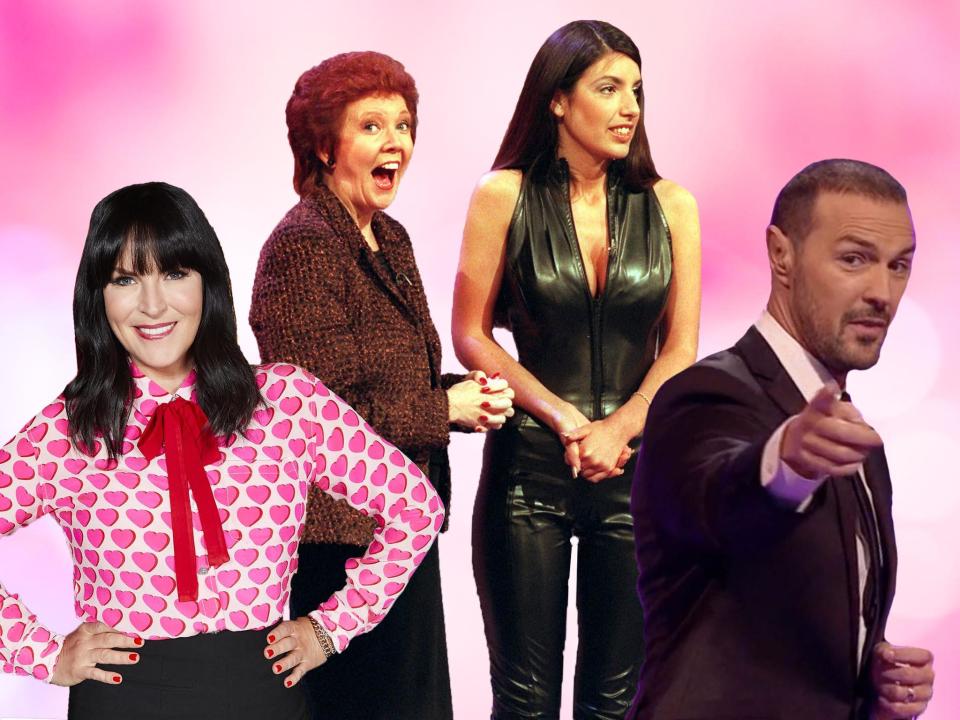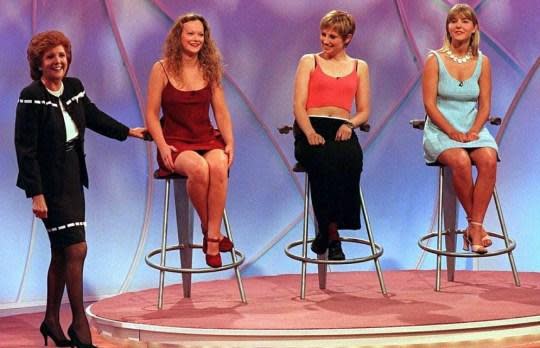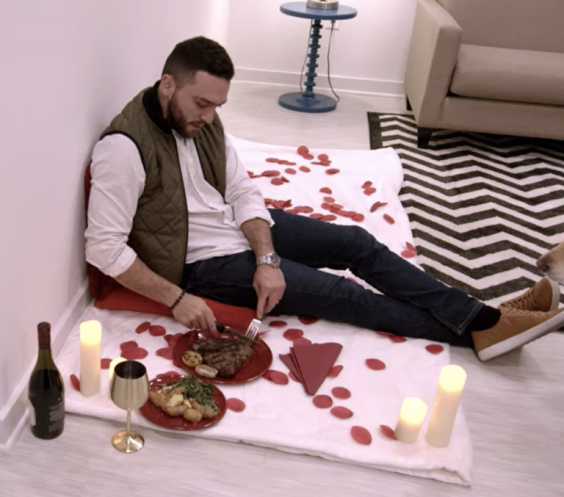Dark rooms, hypnotists and animal masks: How dating shows got wacky

Like heating up an M&S dine-in-for-two meal, watching Take Me Out means you know what you’re in for. An estate agent in a too-tight shirt exits the love lift rolling his hips to Jamiroquai. A sea of HD brows stretches out before him. “All right, ladies,” he says, clapping his hands and rubbing them together. “You’re all looking lovely tonight.” There’s a woman in a fedora. There’s a woman with a pixie crop. There’s a curvy woman in a Fifties rockabilly dress who bakes cupcakes for a living. Everyone’s so horny they bare their veneers like lions.
Then host Paddy McGuinness announces: “No likey, no lighty!” And you hear the sound of pew, pew, pew, pew, pew, pew, pew, as a sea of lights is switched off. McGuinness zones in on one of the ladies, “Melissa, what was it about Ryan that wasn’t doing it for you?”
“I didn’t like his socks, Paddy.”
Sadly we have seen the last of the Isle of Fernando. Last week, ITV announced that it was lights out for the former Saturday night hit. After 11 series, ratings dwindled to a disappointing 1.83 million (Love Island has an average of 2.86 million) and the channel decided to axe the show with McGuinness joking on Instagram: “I better get to the jobcentre.” Most critics have pointed to Take Me Out’s “tired format” and they are right, it was starting to feel rather old-fashioned. A wrinkle that all the botox in Essex can’t fix.
Minus the shoulder pads, Take Me Out had many similarities with early dating shows, most notably the late Cilla Black’s Blind Date. Before the moral relativism of I Wanna Marry Harry and the cynical commercialism of Love Island, Blind Date contestants sought to find love by listening to three potential matches answer questions like “what’s the most important trait in a relationship?” and “if I’m feeling sad, what would you do to cheer me up?” from behind screens. After choosing a partner, contestants picked an envelope containing their date (which could mean anything from a white beach in the Mediterranean, to an ice cream factory in Bognor Regis).

While Blind Date cherished its no-face formula, on Take Me Out women wore so much highlighter that their faces became the anatomical equivalent of a high-vis jacket. But beyond that, Take Me Out followed largely the same principles. Its structure was simple: there were 30 women contestants – to maximise the chance that at least one of them would fancy the man placed before them. As with Blind Date, the presenter was loud, the outfits were small, and getting to know each other came second to cringe-worthy chat-up lines (a woman tells a braces-related gag; man responds, “Would you like to see my drill?”). After heading to the mythical Isle of Fernando for a date, the couple vows to see each other again (but invariably don’t because one of them lives in Aberdeen; the other in Bristol).

Since Take Me Out started in 2010, dating shows have taken a turn towards the freaky. Dress To Impress sees three contestants running around Westfield shopping centre in an attempt to pick out the perfect outfit for a prospective date. In Hello Stranger, a hypnotist makes a couple forget they are in love to test if they still want to be with each other when they are reintroduced. Flirty Dancing helps singles find love by teaching them a dance routine and making them perform it on a first date in the hopes that Cupid’s arrow will hit. Dating exes, sifting through each other’s phone, seeing if your dogs get on – all manner of variables have been introduced to help people find The One.

In a similarly avant-garde vein, this month Netflix released Love is Blind where contestants date while sitting in pods that prevent them from seeing what the other looks like. The prize is marriage – and somehow everyone still wants to win. The show is a sort of bizarre Frankenstein’s hybrid of Dating in the Dark (where singles fondled each other in a pitch-black room) and Married at First Sight (where the matchmade couple’s first date is a wedding), and it is horribly entertaining. Even when blind, somehow all the women fancy the blond jock called Barnett. When discussing what she thinks will be the highlight of married life, one contestant sighs: “Just, like, arms.”

Practically every week a new dating show comes out that prompts the tabloids to scream “peak TV”, dads to ask “what is the world coming to?” and everyone else to compare it to “an episode of Black Mirror”. What is it about these increasingly wild dating shows that audiences find so addictive?
Since art imitates life, it is likely we enjoy watching these shows because our real life romantic relationships are similarly complicated. While it might be strange watching people date in prosthetic animal masks during an episode of BBC3’s Sexy Beasts or have sex in what is essentially a large, fancy coffin for Channel 4’s Sex Box, it’s not that straight forward off the big screen either.
IRL dating has become a kind of dystopian, sexual Top Trumps, where indifference rules most interactions thanks to an abundance of choice. So watching hot people on TV jump through extraordinary hoops to find love becomes strangely reassuring. And if you happen to be unable to get a boyfriend, you can always take solace from the fact that seeing her match’s dick before his face in Naked Attraction did not help Jessica the yoga instructor achieve romantic bliss either. Take Me Out’s time has come; in this age of Tinder it’s truly too pure for this world.

